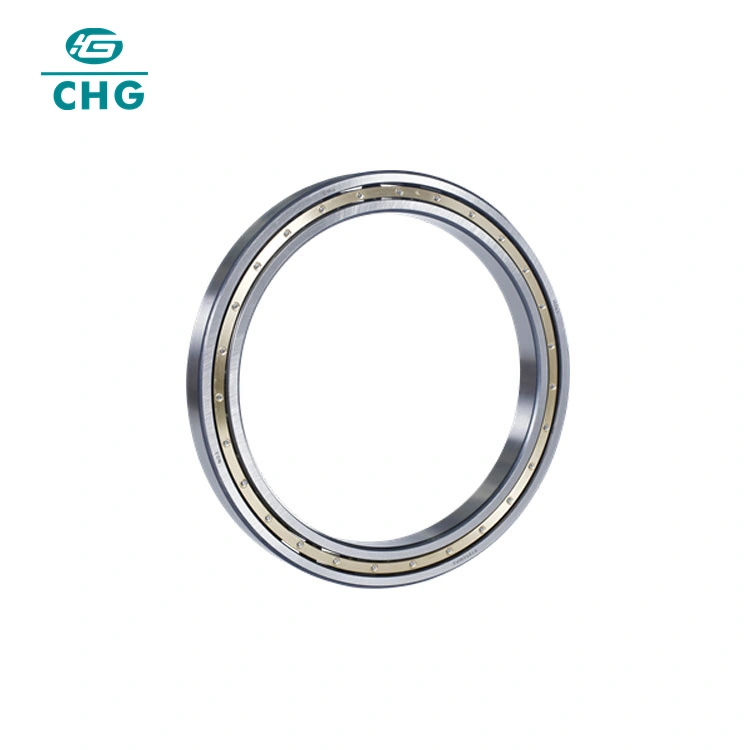Are Deep Groove Ball Bearings Better?
Deep groove ball bearings are a fundamental component in many mechanical systems, known for their versatility and reliability. These bearings consist of an inner and outer ring with a series of balls running in between, guided by a cage. Their design allows them to handle both radial and axial loads, making them a popular choice across various industries. But are they truly better than other bearing types? Let's explore this question in depth, examining their advantages, applications, and considerations.

How do deep groove ball bearings compare to other bearing types?
Deep groove ball bearings are often considered superior to many other bearing types due to their unique combination of features and benefits. When compared to roller bearings, for instance, deep groove ball bearings generally offer lower friction, which translates to smoother operation and reduced heat generation. This makes them ideal for high-speed applications where efficiency is crucial.
Another advantage is their ability to handle both radial and axial loads. While some specialized bearings are designed primarily for one type of load, deep groove ball bearings can effectively manage both simultaneously. This versatility makes them suitable for a wide range of applications, from small electric motors to large industrial machinery.
In terms of maintenance, deep groove ball bearings often have an edge. Their simple design means fewer components that can wear out or fail, potentially leading to longer service life and reduced maintenance requirements. Many deep groove ball bearings come pre-lubricated and sealed, further simplifying maintenance and protecting against contamination.
However, it's important to note that "better" is relative to the specific application. While deep groove ball bearings excel in many scenarios, there are situations where other bearing types might be more suitable. For instance, cylindrical roller bearings can handle heavier radial loads, making them preferable in some heavy industrial applications. Tapered roller bearings, on the other hand, are better suited for applications with heavy combined loads.
The noise level is another factor to consider. Deep groove ball bearings are generally quieter than many other bearing types, especially at high speeds. This makes them an excellent choice for applications where noise reduction is important, such as in electric motors for household appliances or office equipment.
Cost-effectiveness is yet another area where deep groove ball bearings often shine. Their widespread use and relatively simple design mean they can be produced efficiently and in large quantities, often resulting in lower costs compared to more specialized bearing types.
In summary, while deep groove ball bearings offer numerous advantages that make them "better" in many scenarios, the ideal bearing choice always depends on the specific requirements of the application. Their versatility, efficiency, and reliability make them an excellent default choice for many engineers and designers, but it's crucial to consider all factors when selecting the optimal bearing for a given task.
What are the key factors in choosing precision deep groove ball bearings?
Selecting the right precision deep groove ball bearings is crucial for ensuring optimal performance and longevity in your application. Several key factors should be considered during the selection process:
1. Load capacity: One of the primary considerations is the bearing's ability to handle the expected loads. Precision deep groove ball bearings are available in various sizes and load ratings. It's essential to calculate both the dynamic and static load capacities required for your application and choose a bearing that exceeds these requirements with a suitable safety factor.
2. Speed rating: The maximum permissible speed of a bearing is another critical factor. Precision bearings are often used in high-speed applications, so it's crucial to select a bearing that can handle the operational speeds without overheating or premature failure. Factors such as lubrication, cage design, and internal clearance all play a role in determining a bearing's speed capabilities.
3. Precision grade: Precision deep groove ball bearings are manufactured to tighter tolerances than standard bearings. The precision grade affects factors such as runout, noise level, and vibration. Common precision grades include P0, P6, P5, and P4, with P4 being the highest precision. The required precision grade depends on the application's demands for accuracy and smooth operation.
4. Material selection: The bearing's material can significantly impact its performance and durability. While most precision bearings use high-grade steel, specialized materials may be necessary for certain applications. For instance, ceramic balls or hybrid bearings (steel rings with ceramic balls) offer benefits like reduced friction, higher speed capabilities, and improved electrical insulation properties.
5. Sealing and lubrication: Proper sealing and lubrication are essential for bearing longevity. Precision bearings may come with various sealing options, from open designs to contact seals or non-contact shields. The choice depends on the operating environment and the need to retain lubricant or exclude contaminants. Similarly, the lubrication type and method should be carefully considered based on the application's speed, temperature, and load characteristics.
6. Operating temperature: The temperature range in which the bearing will operate is a crucial consideration. Standard bearings typically have a temperature range of -20°C to 120°C, but specialized bearings can operate in more extreme conditions. High-temperature applications may require special heat-stabilized materials or unique lubrication solutions.
7. Mounting and fit: The bearing's fit within the housing and on the shaft is critical for proper function. Precision bearings often require tighter fits than standard bearings to maintain their accuracy. The mounting method, whether it's press-fit, slip-fit, or requires adaptor sleeves, should be considered in the selection process.
8. Stiffness requirements: In applications where rigidity is crucial, such as in machine tool spindles, the bearing's stiffness becomes a key factor. Preloaded bearings or bearings with a specific internal clearance may be necessary to achieve the required system stiffness.
9. Noise and vibration levels: For applications where smooth and quiet operation is essential, such as in precision instruments or high-end motors, the bearing's noise and vibration characteristics become critical. Higher precision grades and specialized cage designs can help minimize noise and vibration.
10. Life expectancy and reliability: The expected service life of the bearing should align with the application's requirements. Factors such as load, speed, lubrication, and operating conditions all influence bearing life. Reliability is especially critical in applications where bearing failure could lead to significant downtime or safety issues.
11. Cost considerations: While precision bearings are generally more expensive than standard bearings, their improved performance and longevity can offer better value in the long run for demanding applications. It's important to balance the initial cost against the expected service life and performance benefits.
12. Environmental factors: The operating environment can greatly influence bearing selection. Factors such as exposure to moisture, chemicals, or abrasive particles may necessitate special sealing arrangements or materials.
By carefully considering these factors, engineers and designers can select the most appropriate precision deep groove ball bearings for their specific applications. It's often beneficial to consult with bearing manufacturers or suppliers, as they can provide valuable insights and recommendations based on their extensive experience and product knowledge. Remember that while precision bearings offer superior performance, they also require more careful handling and installation to maintain their accuracy and reliability.
What are the common applications for precision deep groove ball bearings?
Precision deep groove ball bearings find their way into a wide array of applications across various industries due to their versatility, reliability, and high performance. Their ability to operate at high speeds with low friction and handle both radial and axial loads makes them indispensable in many precision mechanisms. Let's explore some of the most common applications for these bearings:
1. Machine Tool Spindles: In the world of manufacturing, precision is paramount. Machine tool spindles, used in CNC machines, lathes, and milling machines, rely heavily on precision deep groove ball bearings. These bearings provide the necessary accuracy and stiffness to maintain tight tolerances during cutting operations. They also offer the high-speed capabilities required for efficient machining processes.
2. Electric Motors: From small servo motors to large industrial motors, precision deep groove ball bearings play a crucial role. They support the rotor shaft, ensuring smooth rotation with minimal friction and vibration. In high-efficiency motors, the precision of these bearings contributes to reduced energy losses and improved overall performance.
3. Automotive Applications: The automotive industry uses precision deep groove ball bearings in various components. They're found in alternators, water pumps, and transmission systems. In electric vehicles, these bearings are particularly important in the electric drive motors, where efficiency and reliability are critical.
4. Aerospace Equipment: The aerospace sector demands the highest levels of precision and reliability. Precision deep groove ball bearings are used in aircraft engines, flight control systems, and auxiliary power units. Their ability to operate under extreme conditions, including high speeds and temperatures, makes them ideal for these challenging applications.
5. Medical Equipment: In the medical field, precision and reliability are non-negotiable. Precision deep groove ball bearings are used in various medical devices, including imaging equipment like CT scanners and MRI machines. They're also found in dental drills and other handheld medical instruments where smooth, quiet operation is essential.
6. Robotics and Automation: The growing field of robotics relies heavily on precision bearings. Robot arm joints, end effectors, and other moving parts often incorporate precision deep groove ball bearings to ensure accurate and repeatable movements. In industrial automation, these bearings are used in conveyor systems, packaging machines, and other high-speed production equipment.
In conclusion, deep groove ball bearings are favored for their ability to handle combined loads, both radial and axial, with ease. They are known for their simplicity, robustness, and versatility, making them suitable for a wide range of applications from household appliances to industrial machinery. However, the suitability of deep groove ball bearings also depends on the specific application requirements. For heavy radial loads, cylindrical roller bearings might be more appropriate due to their roller shape and arrangement. In applications with heavy combined loads, tapered roller bearings could be a better choice because they are designed to handle both radial and thrust loads effectively.
The choice of bearing also depends on factors such as load capacity, speed rating, precision grade, material selection, sealing and lubrication, operating temperature, mounting and fit, stiffness requirements, life expectancy, cost considerations, and environmental factors. Each of these factors plays a role in determining the optimal bearing for a given application.
Precision deep groove ball bearings are commonly used in machine tool spindles, electric motors, automotive applications, aerospace equipment, medical equipment, and robotics and automation. Their precision and reliability make them indispensable in these high-performing and often critical applications.
Luoyang Huigong Bearing Technology Co., Ltd. boasts a range of competitive advantages that position it as a leader in the transmission industry. Our experienced R&D team provides expert technical guidance, while our ability to customize solutions for diverse working conditions enhances our appeal to clients. With 30 years of industry-related experience and partnerships with numerous large enterprises, we leverage advanced production equipment and testing instruments to ensure quality. Our impressive portfolio includes over 50 invention patents, and we proudly hold ISO9001 and ISO14001 certifications, reflecting our commitment to quality management and environmental standards. Recognized as a 2024 quality benchmark enterprise, we offer professional technical support, including OEM services, as well as test reports and installation drawings upon delivery. Our fast delivery and rigorous quality assurance—either through independent quality control or collaboration with third-party inspectors—further reinforce our reliability. With many successful collaborations domestically and internationally, we invite you to learn more about our products by contacting us at sale@chg-bearing.com or calling our hotline at +86-0379-65793878.
References:
- "Dynamic analysis of deep groove ball bearing with localized defects and misalignment"
- "DEEP GROOVE BALL BEARINGS"
- "Global Deep Groove Ball Bearing Market Research Report 2024"

